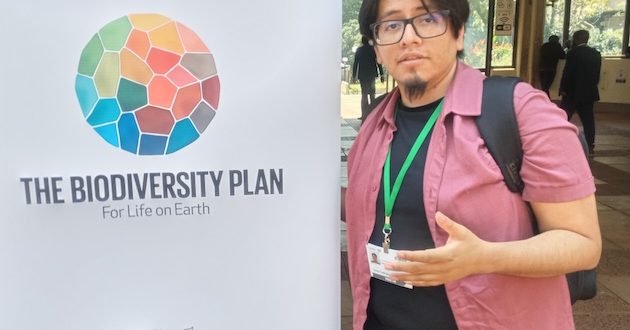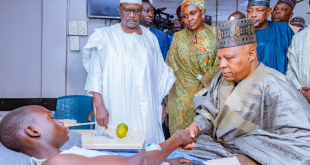
NAIROBI, May 13 (IPS) – The triple planetary crises of climate change, biodiversity loss, pollution, and waste are escalating. At the current pace, the world is on track to lose one quarter of all plant and animal species by 2030, with one species already dying out every 10 minutes. One million species face extinction. Human activity has already altered three-quarters of the land on Earth and two-thirds of the ocean.
Against this backdrop, the 26th session of the Subsidiary Body on Scientific, Technical and Technological Advice (SBSTTA) of the Convention on Biological Diversity (CBD) opened today in Nairobi, Kenya.
Hector Alan Valdes Suarez from the Global Youth Biodiversity Network told IPS that SBSTTA “seeks to build momentum to achieve global and national ambitious goals to halt and reverse the ongoing monumental biodiversity crises.”
Multidisciplinary and open to participation by all parties to the convention, SBSTTA comprises government representatives competent in the relevant field of expertise to ensure that policies are informed by the best available science at the time. SBSTTA has met 25 times to date. The ongoing 26th meeting will acknowledge contributions to the implementation of the Kunming-Montreal Global Biodiversity Framework—also known as the Biodiversity Plan—hashed out at meetings in Kunming, China, and Montreal, Canada, in 2022.
As an open-ended intergovernmental scientific advisory body set up to provide the Conference of the Parties (COP) and, as appropriate, its other subsidiary bodies, with timely advice relating to the implementation of the CBD, SBSTTA “provides a platform for actors outside the Convention, such as youths, women, non-government organizations, and Indigenous Peoples and Local Communities (IPLCs), to observe negotiations on crucial science and also assess how they are or could contribute to, the Convention on Biological Diversity. The Convention is unique as actors outside the CBD can lobby for their views to be included through a Party to the Convention,” he says.
The Convention, which entered into force in December 1993, is the first global agreement to cover all aspects of biological diversity. Senka Barudanovic of Bosnia and Herzegovina, Chair of the SBSTTA Bureau, said the 26th meeting of SBSTTA is “especially important as we are at a critical moment in time to ensure that our actions are guided by a robust foundation of scientific and technical knowledge, tools, and guidelines.”
“The good news is that there is a wealth of knowledge and experience for us to use and build on as we walk this journey together for effective conservation, sustainable use, and the fair and equitable sharing of benefits from the use of biodiversity.”
The six-day meeting seeks to forge agreement among delegates from 196 parties to the CBD on issues pertaining to the implementation of the Kunming-Montreal Global Biodiversity Framework, also known as The Biodiversity Plan. Hard science and a multi-disciplinary approach are high on the SBSTTA 26 agenda as pertains to the implementation of the plan, specifically how the scientific and technical needs of all parties, including the Least Developed Countries (LDCs), among other developing countries, will be met.
Suarez said as parties to the CBD resume negotiations on crucial science and technology, “it is to develop and agree on a monitoring framework to track progress and implementation of the Biodiversity Plan. There are four goals and 23 targets so the indicators are globally uniform to track whether these targets are being achieved and they should be flexible and adaptable to the national context. In my view, many of these indicators are addressing actors outside the convention, such as youths, women, and Indigenous Peoples and Local Communities (IPLCs), and their representation at the meeting to hear what the parties are saying is critical.”
“These actors are contributing to the goal of the Biodiversity Plan at local levels, and their contributions ought to be recognized too, so they matter, and the decisions taken by the parties affect these actors the most, especially women and young people. The process is much more than agreeing on the right science and technical skills to reverse biodiversity loss. Increased accountability and transparency are key even as we gather to agree on how to measure success towards reaching set goals and consistency of reporting at the global level, hence the need for parties to continuously consult,” she said.
The gathering recognizes these concerns, as there are at least 80 representatives of Indigenous Peoples and local communities, as well as observer organizations, participating in the meeting. Indigenous people’s voices are key, as they suffer disproportionately from loss of biodiversity and environmental degradation. Their lives, survival, development chances, knowledge, environment, and health conditions depend on the successful implantation of the plan.
Cyri Wafula Nyongesa from the International University Network on Cultural and Biological Diversity agrees, telling IPS that even as scientists hash out hard science, technical, and technological knowledge to support the implementation of the Biodiversity Plan, there is a need to look at existing gaps in its implementation framework. These gaps include the need for capacity building and reporting frameworks that are simple and also draw connections between global and national plans.
As agreed in a landmark decision of CBD COP 15 in December 2022, the UN-driven strategy is the world’s masterplan to halt and reverse biodiversity loss by 2030, and sets out a pathway to reach the global vision of a world living in harmony with nature by 2050 using four goals and 23 targets. The goals are to protect and restore nature, to prosper with nature, to share benefits fairly, and to invest in and collaborate for nature’s benefit.
“One year and a half after the Biodiversity Plan was historically adopted, parties to the CBD must now fine-tune the important details that will take the world from agreement to action,” said David Cooper, Acting Executive Secretary of the CBD. “The subsidiary body is leveraging science and technology to help the parties to the CBD deliver on their commitment to people and nature.”
Ongoing discussions are firmly framed within the CBD overall agenda to address all threats to biodiversity and ecosystem services, including threats from climate change, through scientific assessments, the development of tools, incentives, and processes, the transfer of technologies and good practices, and the full and active involvement of relevant stakeholders.
Delegates have resolutely set the ball rolling towards reporting on the monitoring framework, the national status of implementation, and the mobilization of financial resources for the Biodiversity Plan. The ultimate goal is to fast-track the implementation of sustainable solutions to biodiversity loss, restore ecosystems, and protect indigenous rights.
IPS UN Bureau Report
Follow @IPSNewsUNBureau
Follow IPS News UN Bureau on Instagram
© Inter Press Service (2024) — All Rights ReservedOriginal source: Inter Press Service
 Top Naija News – Nigeria News, Nigerian News & Top Stories Top Naija News – Nigerian Newspapers, Nigerian News. topnaijanews is a daily Nigerian newspaper covering Latest News, Breaking News, Entertainment, Sports, Lifestyle and Politics.
Top Naija News – Nigeria News, Nigerian News & Top Stories Top Naija News – Nigerian Newspapers, Nigerian News. topnaijanews is a daily Nigerian newspaper covering Latest News, Breaking News, Entertainment, Sports, Lifestyle and Politics.




